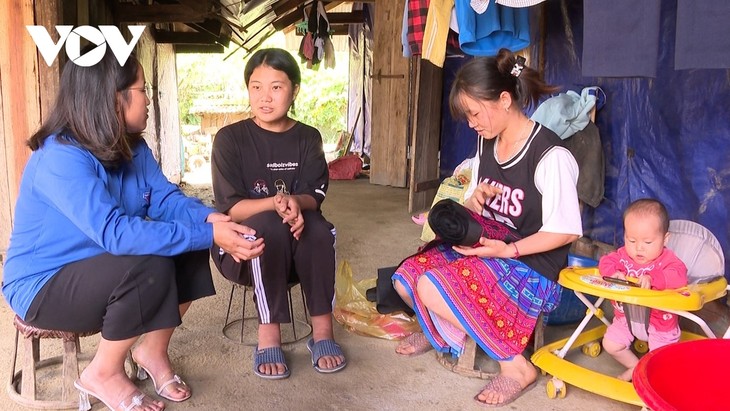Social protection for women ensured
Hong Van -
(VOVWORLD) - The Vietnamese government has adopted several policies to promote women’s advancement and contribution to national development. The policies focus on social protection for women in the informal sector and industrial park, and on labor, training, insurance, housing, kindergartens and schools.
 Communications on child marriages prevention have been strengthened among ethnic minority women (photo: VOV) Communications on child marriages prevention have been strengthened among ethnic minority women (photo: VOV) |
The Vietnamese government has always attached special importance to social protection and gender equality issues in order to ensure true equality between men and women in terms of opportunities, participation, and benefits in politics, economics, culture, and society.
Vietnam has adopted several strategies and policies to promote gender equality and women’s advancement which have raised public awareness about women’s role and position and created an environment for women to affirm their position.
According to the Vietnam Women’s Union, Vietnamese women own 26% of all businesses. Vietnam is among the 10 countries with the highest number of women-led businesses.
Female ambassadors, female business leaders, and female soldiers in the UN peacekeeping missions have become ambassadors of peace, friendship, cooperation, and development. The Ministry of Planning and Investment has fine-tuned policies to help women start a business, and has set up a network of businesswomen.
Deputy Governor of the State Bank of Vietnam Dao Minh Tu said: "In the revised Law on Credit Organization to be submited to the National Assembly we propose that micro financial organizations are allowed to open bank accounts in order to give customers, especially women, easier access to capital."
The Ministry of Health is revising health policies to include early detection of cancer-related diseases for women. Vietnam is one of the countries who have completed the Millennium Development Goals on gender equality and raising women’s status ahead of schedule.
The National Strategy on Gender Equality in the 2021-2030 period aims to improve gender equality and make it easier for women to participate in and benefit from all socio-economic activities.
Hong Van